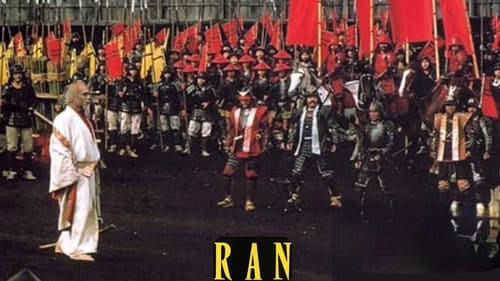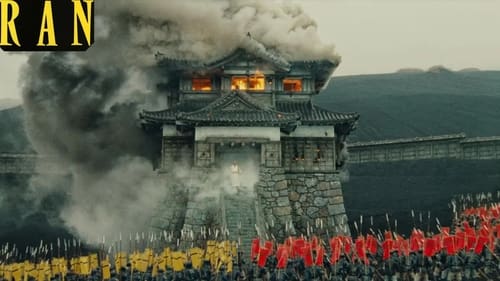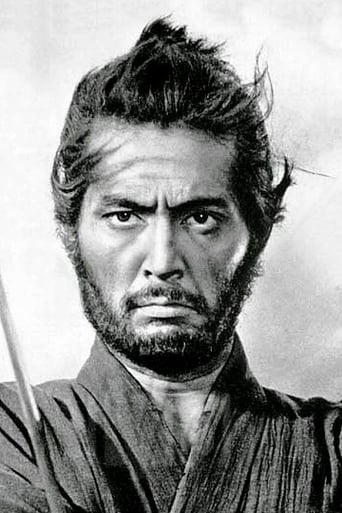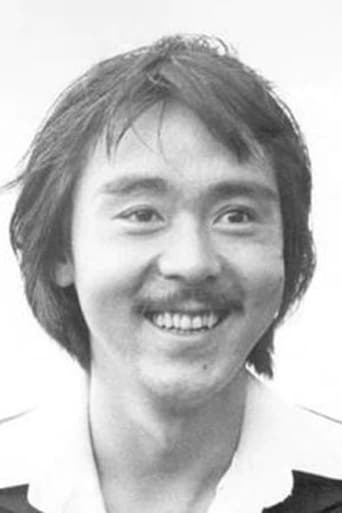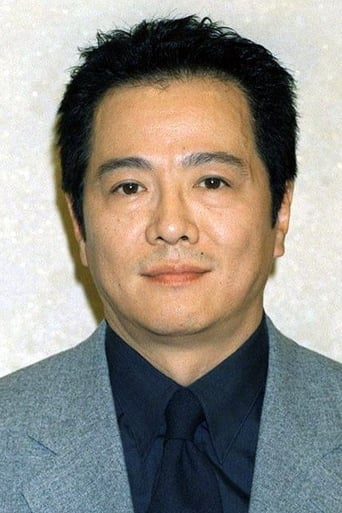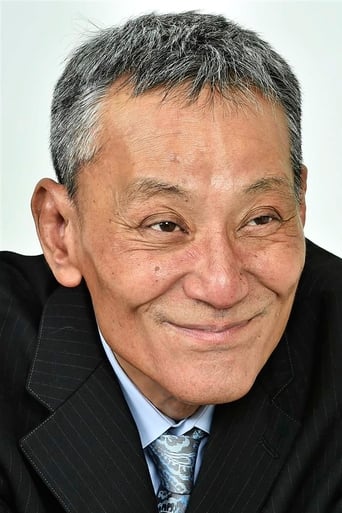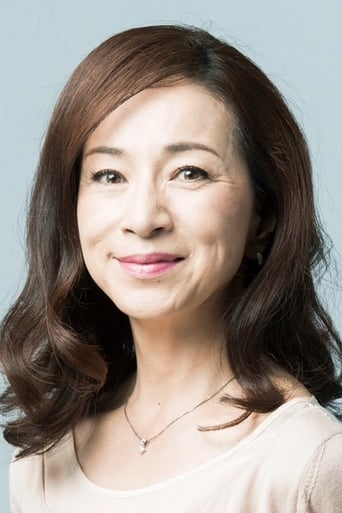851222
Greetings from Lithuania.To shortly sumarize "Ran" (1985), a movie made by a legendary Akira Kurosawa - this is a great movie. It is superbly crafted, greatly acted and written and wonderfully directed. There are few battle scenes, but both are memorable in its own way - especially the haunting castle siege scene done without sound effects, accompanied only by haunting score - amazing sequence. I also highly enjoyed the story itself - its shows that one has to know how to give a power to the others, even if others are his family and how it can turn out if its done not in a right way - something to be learned even in these times.Overall, "Ran" is a pure classic. Superbly made with themes that done age - this is sure must see for everyone who appreciate great cinema.
The Movie Diorama
The man was a genius when it came to directing these long Japanese war epics and Ran is no different. This is Kurosawa's interpretation of Shakespeare's King Lear, a play that unfortunately I did not study. The plot consists of Lord Hidetora abdicating his empire and splitting the kingdom between his three sons, who each want to have total control. And so many castles are raided and many horseback battles are conceived. Whatever the scene, everything was filmed to perfection. I just adore Kurosawa's style, he doesn't rush a single scene. Leave a castle burning for 30 seconds, watch a man run through a field for 30 seconds or even look at the sky for 30 seconds. In theory, I should be bored...but his artistic integrity and majestic style is a sight to behold. What resonated with me the most was the screenplay, also by Kurosawa. Several lines of dialogue felt like Shakespeare and it's admirable to see an influential film maker be...well...influenced by another famous writer. Scenes where Hidetora descends into madness are great examples of this. Tatsuya Nakadai, who portrayed Hidetora, was once again outstanding. This equals his role from Kagemusha, it was an emotive and poignant portrayal of a father who has been betrayed by his children. The battle scenes were masterful work, hundreds of extras in clan attire definitely filled up the screen with contrasting colours. The costume and production design were yet again wonderful to look at. I do love me the traditional Japanese environment that Kurosawa captures with ease. Lady Kaeda though, was the manifestation of evil...her manipulative skills were fascinating to watch. This leads me to my only problem, which is that none of the major characters are likeable, even Hidetora had issues. So I struggled to become emotionally invested in these characters. However, the purpose of this iteration was to explore themes of betrayal and insanity, Kurosawa conveyed them to technical perfection. Not a complete masterpiece, but extremely close to being one.
sir-mauri
An absolute masterwork, the human being's dark sides as the main protagonists. Vengeance, hatred, betrayal, greed and what they bring with themselves. It's the deepest film that I've seen so far on Kurosawa's filmography. Visually beautiful, pure poetry in every frame and every death. There is strong symbolism on the red color and the fire. The history of humanity has been covered by blood and fueled with greed since the very beginning, among these beautiful landscapes, the human race have been destroying themselves no matter the family bond or friendship. Not only Kurosawa's best, but also the best film adaptation of Shakespeare.
quinimdb
"Ran" is a poignant epic based on Shakespeare's King Lear. Many call it one of the best (if not the best) Shakespeare film adaptations, and while I haven't seen enough Shakespeare films to say for sure, it's hard to see any other one topping this one.The film begins on huge rolling hills, where Lord Hidetora has gathered his acquaintances and his three sons. He blacks out, and suddenly he decides he will choose his successor right there. He picks his oldest son, Taro. Taro and the middle son, Jiro, suck up to their father by saying they will serve him loyally until his death. The youngest son, Sabaro, knows exactly what is going on. He calls them out on it. Then Lord Hidetora decides he will give power to all three of his sons, but Sabaro once again sees flaws in this. He knows the three brothers will not get along. He is banished, since Hidetora needs everyone to be loyal and follow him blindly, rather than taking criticism when he needs to.This causes a slow downward spiral. Taro is convinced by his wife, whose family was killed and village was burned by Hidetora, to force his father to give him complete power, but he is clearly not cut out for being a King. He already can't control his soldiers. Hidetora leaves the kingdom and while he is gone, Tango Hiragana, one of his advisers, comes to him with gifts given from peasants. Hidetora is told that the samurai never accepts charity, so he orders the peasants dead, but he finds out from Tango that those peasants were told by Taro to never send food to Hidetora, or else they will die. These people were pushing away Taro and asking for Hidetora back, but he just killed them. Tango suggests Hidetora should put Sabaro as king, but Hidetora didn't want the truth. He now has no where. Hidetora is told that Tango is just trying to stir up trouble between his family and take the throne for himself. He pretends that he did nothing wrong, but this causes his downfall. Both Taro and Jiro betray him and invade the castle at the same time, in an incredibly violent and intense scene. Not only have Hidetoras sons betrayed him, but all of his loyal followers have died in front of his face and it was his fault. Despite nearly dying many times, and arrows and gunfire flying all around him, Hidetora comes out alive, and what follows is his punishment, his personal hell. He confronts all of his past atrocities, such as a boy whose family he killed, and eyes torn out. The wreckage of a palace he burnt to the ground. But the two most truthful people in the film, aside from Sabaro, Lady Kaede, his loyal jester whom he saves earlier in the film (part of what shows Hidetora has the potential to be a good person, since she jokes about his foolishness frequently), and Tango. They look for Sabaro. Meanwhile, his son Jiro, who killed his other son that was taking the throne, is sitting atop the throne, but he is being controlled by his brothers widow, who is now his wife. She threatens him and then she controls him by earning his trust. Jiro isn't strong enough to be a leader of his own, so he succumbs to blind loyalty to his new "wife". Sabaro confronts Jiro, and this is where Jiros downfall begins. He is told by many that he shouldn't start a war with Sabaro, and he tells Sabaro he won't, yet he stabs him in the back the first chance he gets. He attacks, but Sabaro has a plan. There are men in the woods firing guns at the oncoming attackers, and despite Jiros orders, which they don't want to follow since he didn't truly earn their trust, the men retreat. Jiros wife reveals that she was just trying to get revenge for her family, and she did it. Then she is killed. Sabaro then reunites with Hidetora, and Hidetora at first can't forgive himself and doesn't think Sabaro will forgive him, but he comes to his senses and seems completely changed, and he essentially had redeemed himself. All he cares about anymore is Sabaro. Then Sabaro is killed by one of Jiros soldiers. Lady Kaede blames the gods who she worshiped, but the true blame is on man. As one soldier states, the gods try to make things right, but man has to always go and make things worse. We have an obsession with violence and our rulers will always continue to kill and kill, until the rational ones die and the cycle repeats itself. Then we get a poignant shot of Tsurumaru, the kid who had his eyes torn out, dropping a portrait of Buddha as he stands atop a mountain, showing how humans themselves deny justice from the gods and truly control things. And the good will always go out with a whimper, not a bang. They don't get to go out as valiant soldiers.



